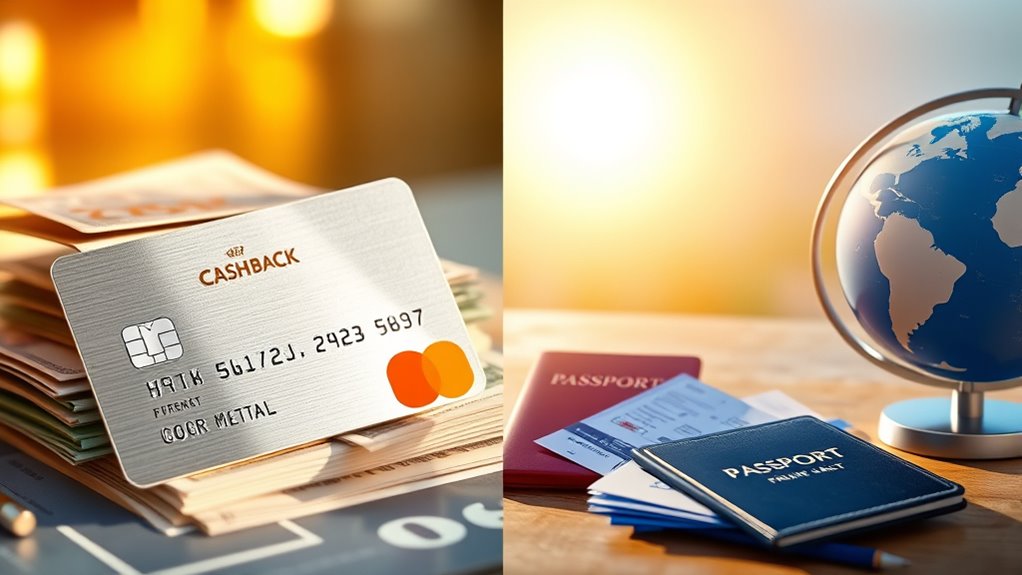Choosing between cashback and travel points depends on your spending habits and goals. If you prefer straightforward savings and need flexible rewards, cashback offers immediate cash back for everyday expenses. On the other hand, if you love travel and can plan ahead, travel points can give higher value for flights, hotels, and upgrades. To make the best choice aligned with your lifestyle, consider your priorities—more details are coming up.
Key Takeaways
- Cashback offers immediate cash savings, ideal for flexible, short-term spending needs and straightforward redemption.
- Travel points provide higher value for premium travel and upgrades, suited for frequent travelers with long-term goals.
- Cashback is more versatile, usable anywhere, while travel points require booking through specific partners and planning.
- Travel points can accumulate significant rewards over time, enabling luxurious trips and experiences.
- Managing expiration policies and redemption options is crucial for maximizing benefits of both rewards types.
Understanding the Core Differences

To understand the core differences between cashback and travel points, it’s important to recognize how each rewards your spending. Cashback gives you a straightforward percentage back on your purchases, which you can use as cash, statement credits, or direct deposits. It’s simple, flexible, and provides immediate value. Travel points, on the other hand, are typically earned through specific categories or card spending and are designed to be redeemed for flights, hotels, or other travel-related expenses. They often require you to plan ahead and understand redemption options to maximize their value. While cashback offers direct monetary benefit, travel points focus on providing perks and experiences that can elevate your travel adventures. Knowing these fundamental distinctions helps you decide which rewards system aligns best with your financial habits and goals. Additionally, understanding the essential benefits of each reward type can help you optimize your rewards strategy effectively. For example, some cards offer bonus categories that can significantly increase your earnings depending on your lifestyle. Furthermore, evaluating redemption flexibility is crucial, as it influences how easily you can use your rewards for desired purposes. Being aware of the reward expiration policies can also prevent losing accumulated points or cashback due to time limitations. Moreover, considering the cost of earning rewards—such as annual fees or spending requirements—can impact the overall value you derive from each program.
Evaluating the Financial Benefits

When comparing cashback and travel points, consider how quickly you can see value from your rewards. Cashback offers immediate savings, while travel points may build into bigger benefits over time. Understanding your spending habits helps determine which option maximizes your financial gains. Additionally, evaluating your investment goals can help decide whether the flexibility of cashback or the potential for higher-value travel rewards aligns better with your financial strategy. Recognizing relationship dynamics can also influence your choice, especially if your spending is affected by shared financial decisions or partner preferences.
Immediate Value Realization
Choosing between cashback and travel points hinges on how quickly you can access and use their financial benefits. Cashback offers immediate value because you can redeem it directly as cash or statement credits, giving you instant control over your funds. You see the rewards in your account right away, which is ideal if you need quick financial flexibility. Travel points, on the other hand, often require you to book flights, hotels, or experiences before realizing their value. While they can be worth more in certain situations, the redemption process takes longer and depends on availability. If immediate gratification matters most, cashback provides straightforward, instant benefits. Travel points, however, may deliver higher value but involve a waiting period before you can fully access their financial advantage. Additionally, understanding the different types of rewards, such as family photoshoot fails, can influence your decision based on your lifestyle needs.
Long-term Earning Potential
While cashback delivers immediate financial benefits, travel points often excel in rewarding long-term spending habits. If you consistently use a travel rewards card for your regular expenses, those points can accumulate quickly, leading to significant travel perks over time. Unlike cashback, which offers straightforward savings, travel points build up and can be redeemed for flights, hotel stays, or upgrades, providing value long after your purchases. This long-term earning potential depends on your spending patterns and redemption strategies. If you’re disciplined and plan to travel regularly, travel points can yield more substantial rewards over several years. Additionally, understanding the energy efficiency of reward programs can help you optimize your benefits and maximize your rewards potential. However, if your spending is irregular or your travel plans are uncertain, cashback might deliver more consistent, immediate benefits. Understanding the nuances of narcissistic behaviors can help in making more informed financial choices, especially when dealing with complex situations or manipulative tactics. Choose based on your financial habits and future travel goals.
Suitability for Different Spending Habits

Your spending habits can influence which rewards program works best for you. If you have flexible spending patterns, cashback offers might provide straightforward savings. However, if you aim for high-value redemptions, travel points could maximize your benefits. Utilizing targeted campaigns can further enhance your rewards strategy by helping you reach specific goals more efficiently. Additionally, understanding the role of limits in creative practice can inspire innovative ways to optimize your rewards and make the most of your spending. Being aware of cookie categories and how they impact data collection can help you better manage your privacy preferences while maximizing the personalization of your rewards. For example, knowing how redemption restrictions apply can help you plan more effectively to avoid losing value. Incorporating wall organization ideas into your home decor can also create a more organized and aesthetically pleasing environment, making everyday tasks more enjoyable.
Flexible Spending Patterns
Flexible spending patterns are essential when deciding between cashback rewards and travel points because they directly impact how well each option aligns with your spending habits. If you have varied expenses across different categories, cashback offers straightforward savings that adapt to your needs. You can use the cash for anything, making it versatile. Conversely, travel points often reward specific types of spending, like flights or hotels, so they work best if your expenses match those categories regularly. If your spending is unpredictable or spread out, cashback might provide more flexibility. Additionally, understanding the redeemability of points versus cash can influence your decision, as some rewards are more easily converted to usable benefits. Moreover, the timing of redemption can also play a crucial role in maximizing value, especially if you plan your rewards around upcoming expenses or travel plans. Research shows that understanding your spending patterns can significantly influence the effectiveness of your rewards strategy. Incorporating how you manage reward expiration can also help ensure you don’t lose potential benefits due to time limits.
High-Value Redemption Potential
The potential for high-value redemption is a key factor to contemplate because it determines how much worth you get from your rewards relative to your spending. With travel points, you can often redeem for premium flights, hotel upgrades, or exclusive experiences that offer a much higher value per point. If you travel frequently or plan big trips, this can substantially maximize your rewards. Cashback, on the other hand, provides straightforward savings, but its redemption value tends to be lower and more uniform. Your spending habits influence which option suits you better: if you prefer flexibility and consistent cash savings, cashback might be more practical. However, if you aim for maximum value on travel-related expenses, travel points can access higher redemption potential, giving you more bang for your buck. Additionally, understanding payment processing and security measures can help you manage your rewards and transactions more effectively. Considering the ease of use and how seamlessly rewards can be applied to your purchases is also essential for optimizing your benefit. For example, leveraging redemption options tailored to your spending patterns can significantly enhance the value you derive from your rewards.
Flexibility and Redemption Options

Have you ever wondered which option offers more control over how you use your rewards? Cashback gives you straightforward flexibility—you can spend it anywhere, anytime, just like cash. Travel points, on the other hand, often come with specific redemption options, like flights, hotels, or upgrades, which can limit your choices.
Here’s a quick look at the differences:
| Feature | Cashback | Travel Points |
|---|---|---|
| Redemption Flexibility | Use anywhere, anytime | Limited to travel partners |
| Ease of Use | Simple, direct cash value | Requires booking through providers |
| Control Over Use | High—spend on anything | Moderate—restricted to travel |
| Value Stability | Consistent value | Varies based on redemption options |
Your choice depends on whether you want control or specific travel perks.
Impact on Long-Term Goals

Choosing between cashback and travel points can substantially influence your long-term financial and lifestyle goals. Cashback rewards provide straightforward savings, helping you build cash reserves or pay off debt faster. Over time, this can lead to greater financial stability and flexibility. Conversely, travel points encourage investing in experiences, motivating you to save for trips or upgrade your lifestyle. While they may require more strategic planning, they can help you realize long-term dreams of travel and adventure. Your choice should align with your priorities—whether you value immediate savings or long-term experiences. Both options can impact how you allocate your resources, set savings targets, and plan your future. Ultimately, understanding this influence helps you make choices that support your broader financial and personal aspirations.
Making the Best Choice for Your Lifestyle

Your lifestyle preferences play a significant role in determining whether cashback or travel points suit you best. If you spend most of your money locally and prefer straightforward rewards, cashback offers simplicity and immediate value. You can use the cash for everyday expenses or savings without restrictions. On the other hand, if you love traveling and can maximize points for flights, hotel stays, or upgrades, travel rewards might be more beneficial. Consider how often you travel, your flexibility, and your willingness to plan ahead. Think about your spending habits—if they align with earning and redeeming travel perks or if you prefer the instant gratification of cashback. Ultimately, choosing the right option depends on what fits your lifestyle and financial goals best.
Frequently Asked Questions
Can Cashback Rewards Be Combined With Travel Points?
You can often combine cashback rewards with travel points, depending on your credit card. Many cards allow you to earn cashback on everyday purchases while also accumulating travel points for flights or hotel stays. Some programs even let you convert cashback into travel points or use both for different benefits. Check your card’s terms, and you might maximize rewards by using both strategies to suit your travel and spending habits.
Are Travel Points More Advantageous for International Trips?
Travel points often offer better value for international trips because they can be redeemed for flights and upgrades, saving you more money. If you plan frequent or long-distance travel, accumulating points can lead to free or discounted international flights. Cashback rewards are straightforward but usually don’t provide the same high-value redemption options worldwide. So, for international trips, travel points typically give you more advantages and flexibility.
How Do Annual Fees Affect the Overall Value of Each Option?
Your wallet’s battle is intense, and annual fees can tip the scales considerably. If you choose a cashback card with a high fee, you might end up paying more than you earn back, making it a poor deal. Conversely, travel cards with annual fees often offer perks and points that outweigh costs if you travel frequently. Consider your spending habits carefully to maximize value and avoid paying for benefits you won’t use.
Do Cashback Offers Have Restrictions or Minimum Spend Requirements?
Cashback offers often come with restrictions or minimum spend requirements you need to meet to qualify for the rewards. For example, some cards require you to spend a certain amount within a billing cycle to earn the full cashback. These rules can vary by issuer and offer, so you should read the terms carefully. Meeting these requirements guarantees you maximize your cashback rewards without risking ineligibility or missing out.
Which Option Offers Better Protection Against Fraud or Misuse?
When it comes to protection against fraud or misuse, cashback offers often provide better safeguards. You typically get direct refunds, and your money is less likely to be tied up or complicated by points systems. Plus, many cashback programs have strong fraud detection measures and easier dispute processes. Travel points can be more vulnerable if your account is compromised, as they might be harder to recover or verify, so cashback generally offers more straightforward security.
Conclusion
Ultimately, choosing between cashback and travel points depends on your spending habits and goals. Don’t put all your eggs in one basket—consider a mix that suits your lifestyle. If you’re chasing immediate savings, cashback might be your best bet. But if travel dreams excite you, points can turn into unforgettable trips. Remember, it’s not just about the prize at the end of the rainbow, but enjoying the journey along the way.









